Social isolation and loneliness are serious public health concerns in the United States, nearly 25% of adults aged 65 and older are considered socially isolated.
Living alone, health issues, the death of a spouse, difficulty driving, and hearing loss can negatively affect the social lives of seniors.
A sense of belonging and social connections are vital components for the health and wellness of older adults.
This article will discuss the effects of social isolation among seniors, how socialization protects seniors’ health, and how to help seniors stay socially connected.
How Social Isolation Negatively Affects Seniors
Social isolation is the lack of social contact and the inability to interact with others.
Seniors, especially those who live alone and have minimal social interactions, often experience loneliness.
Social isolation can negatively affect the health and wellness of adults aged 50 and older in the following ways:
- A 29% increased risk of heart disease and a 32% increased risk of stroke
- Higher rates of depression, anxiety, and suicide
- Premature death
- An increased risk of dementia
- A weakened immune system
Health and Wellness Benefits of an Active Social Life for Seniors
There’s more to healthy aging than diet and exercise. Socialization is vital for older adults. Seniors involved in various activities and who frequently socialize with friends and family are generally healthier and happier. Being around people who love and care for you increases your confidence and well-being. Even having a pet can increase feelings of happiness for older adults. There’s nothing better than waking up or coming home to a happy dog or a cuddly cat.
Socially active seniors enjoy the following health benefits:
- Improved mental health
- Reduced risk of mental decline
- Lower blood pressure
- Higher levels of cognitive function
- Increased feelings of self-worth and belonging
- More confidence
Helping Seniors Stay Socially Active
Whether you’re feeling the effects of social isolation or worried about an older loved one being isolated, there are ways to find social opportunities.
Consider Senior Living
We usually think of senior living as long-term care for sick older people. Today’s older adults want to live in active, vibrant communities designed to make it easy for them to socialize and participate in various activities.
Senior living communities like Seasons Senior Living keep residents socially active with the following services and amenities:
- Fitness classes
- A full calendar of engaging activities and fun outings
- Transportation to shopping and local events
- Sports bar
- Billiard room
- Library
- Aviary
- Theater
Volunteer in Your Community
Get involved in your community by volunteering at a shelter, local community center, or youth center.
Take a Class
Sign up for a senior fitness class at your local YMCA, take a computer class, learn a second language, or sign up for pickleball or golf lessons.
Wrap-up and Next Steps
Healthy aging involves many things, including maintaining good physical, mental, and emotional health. Social isolation and loneliness will negatively affect your physical and mental health. Interacting, connecting, and building relationships with other people leads to a healthier, happier, and more enjoyable life.
Contact the friendly professionals at Seasons Senior Living if you need assistance or have questions about senior living.


